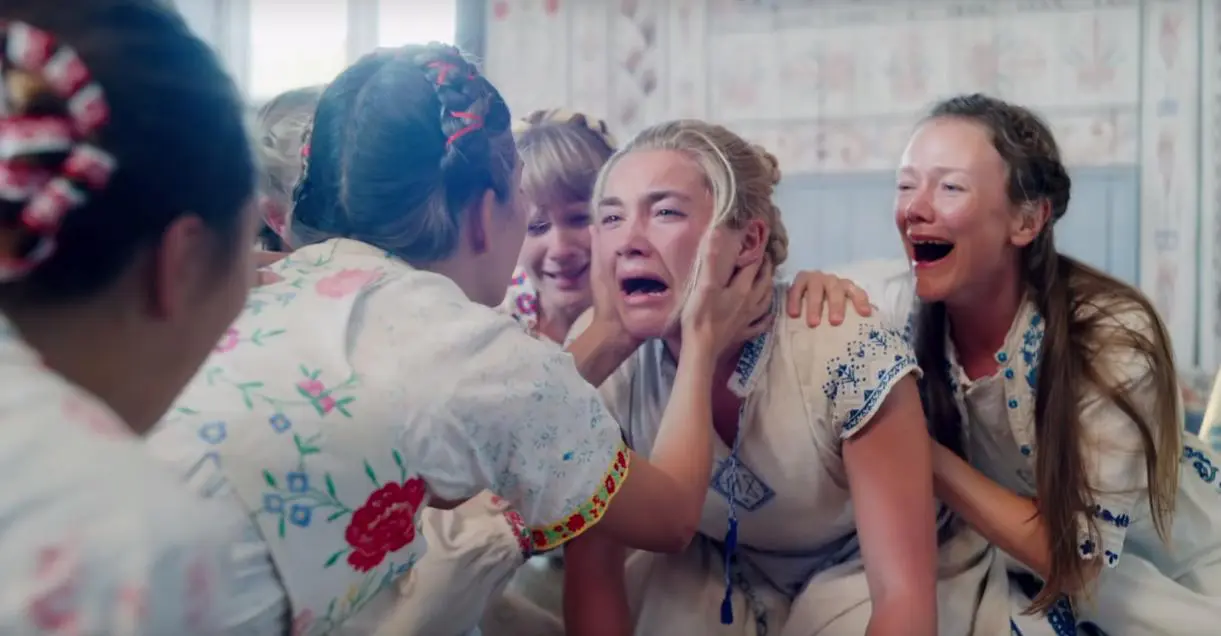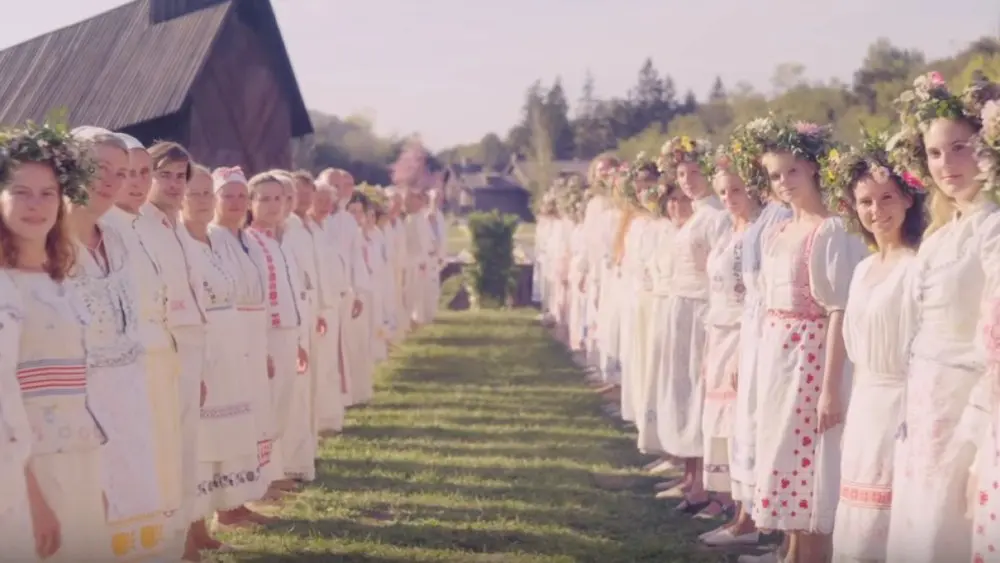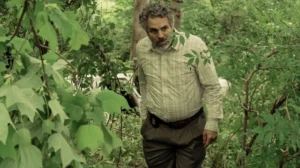Summary
Seeing as the word ‘festival’ derives from the Latin for feast, and Midsommar is about a 9-day festival during the Swedish summer solstice, the film is lacking for meat on the skeleton of a great idea.
Seeing as the word ‘festival’ derives from the Latin for feast, and Midsommar is about a 9-day festival during the Swedish summer solstice, the film is lacking for meat (sorry veggies) on the skeleton of a great idea. When I saw the trailer, I thought this could be one of my films of the year; an Ari Aster daylight horror movie about travelers at a secret festival. But that’s the best thing about Midsommar, the idea of it, the promising seedling that grows into a malformed plant. Whereas there’s a wealth of originality along with homage, there isn’t the precise execution that capitalizes upon them.
Florence Pugh is a goddess and should be prayed to. Her performance is a show of tragedy from the very beginning — albeit a tragedy that feels superfluous, gratuitous even when compared with the whole film — and grief. It’s just a shame Aster covered as much, and so damn well in Hereditary.
Whilst he certainly wrings the commitment to craft from his talented cast, especially in some of the more absurd and grueling scenes – someone get Florence some water as the woman must be dehydrated from all those cried tears — they mostly still feel underused and in fact, underserved. For a film this long (2 hours 20 minutes), there is no excuse for having poorly served characters.
There are embellishments for the sake of run-time and a schism between the friendships of the group feels futile, lazy and goes nowhere remotely interesting. Even if it did, the friendship group is a liberal lad set-up of smut, misogyny, false idealism and piss-taking. Jack Reynor’s Christian (aptly named for his sacrifice – inviting Pugh’s grieving Dani to the boys-on-tour festival hoping she’s too upset to go: yes, that much of a dick!) is the leader of his pack which features William Jackson Harper’s semi-sincere Josh, Will Poulter’s virile Mark and Vilhelm Blomgren’s foreign exchange student Pelle, the In to the secret festival.

These are the characters we are supposed to care about but they do nothing but grate – which is clearly purposeful on Aster’s part as the entire film seems an exercise in how deeply you can grind your teeth. Dani is incessantly made to feel silly for asking sensible questions, dismissed, defied or left to stitch back ties she didn’t tear. This is a marathon of passive-aggressive penis posturing where sharp sprints would have sufficed amidst the pagan-esque mythologies and flowery foreboding. Though after an hour – and one fun and fizzy mushroom trip – when the first gushes of blood see the sleepless sun, Midsommar utilizes its superb on-location filming and rich and intricately woven production design into something as quietly sinister as skin cancer through sunburn. It’s such a shame we have to digress to the aforementioned cattiness of the lads to see it.
Much of the would-be scares or plotted shocks are often labeled early on. I was hoping those labels would be signposts that cause us to think we’re traveling one way only to realize we’ve stumbled into a field we’re utterly unwelcome in, alas, that isn’t the case. The set pieces may be visually tasty with their hyper-real gore or unsettling discomfort from glaring eyes and perverse rites leaving you as uncomfortable as an unscratchable itch, but beyond them, and sometimes during them, there’s a lot of vapid filler.
Where Hereditary’s atmosphere was palpable and oppressive, leading to the many shocks and scares hitting with blunt force, Midsommar never captures that essence although it cannot be faulted for not trying. The location and set design is gorgeous and fulfills the promise of some reclusive hedonistic festival (shot wide and open compared to the ultra-close-ups on Dani by DP Pawel Pogorzelski) but it rarely leaves you unsettled other than thinking you need sunglasses and a packet of tissues to combat the omnipresent glare and impending hay fever. It doesn’t burrow beneath your skin, even with some hallucinatory visual treats and creative how-the-hell-did-they-do-that camera contortionism, we’re observers to it and not sitting in the workshop staring at miniature houses crafted with painstaking detail and resentment.

Midsommar wants to do a hell of a lot of things because it’s inspired by a hell of a lot of things. Whilst tonal flexibility is valiantly pursued (I didn’t expect to laugh as much as I cringed) the whole concoction of filmic ingredients, political commentary, female oppression, male dominance, mental health, absurdity, surrealism, horror, etc brewed for our hyper-aware times is a stodgy broth we can perceive is no good for us. So, we can, of course, deny a bowl when the witch offers it with tasty promises. Perhaps the runtime is most indicative of the ambition to coalesce so many complicated parts but ultimately none strike true. Dani’s anxiety and depression are realized – a dream sequence adeptly conveys her aching loneliness and subconscious fears – but thrown away like a flaky scab for the other above themes and genre commitments.
A powerful film debut I’ve recently watched which is quite similar in x-ray form to Midsommar is Isabella Eklof’s Holiday, about a young woman holidaying with volatile men who abuse her – albeit in more visually visceral physical and sexual ways – from which she can’t seem to escape. Both films deal with violence in soberingly realistic ways but the scope of Holiday is far smaller but the more impactful for it. Dani’s mental and emotional abuse is no less harrowing but is continually shrugged off for some creepy blonde kids or the creepier grey-haired men.
As the bombastic end approached, which like Hereditary before it is quite the carnival of naked flesh – alive and dead – I thought I was glad it was over with some semblance of finality. That’s until I saw the final shot and realized that was the film I’d wanted all along. Something that utilizes the talent involved not only for emotional degradation but for the relevant social shifts in sadistic yet satisfying ways. Midsommar is certainly worth seeing as it seems to be polarising critics and audiences as it is a singular movie experience from a kaleidoscopic mind in Ari Aster. Never as potent, unsettling, horrifying or shocking as Hereditary but just as inventive and imaginative, Midsommar will still be a cult favorite for cinemagoers and cults alike. Though the intoxicating aromas it releases don’t fulfill the body’s hunger as much as it acts like sustenance as we eagerly await what meal is served next.
READ: 10 Movies like Midsommar




